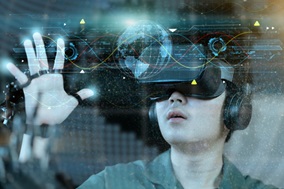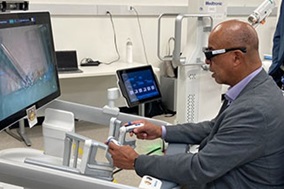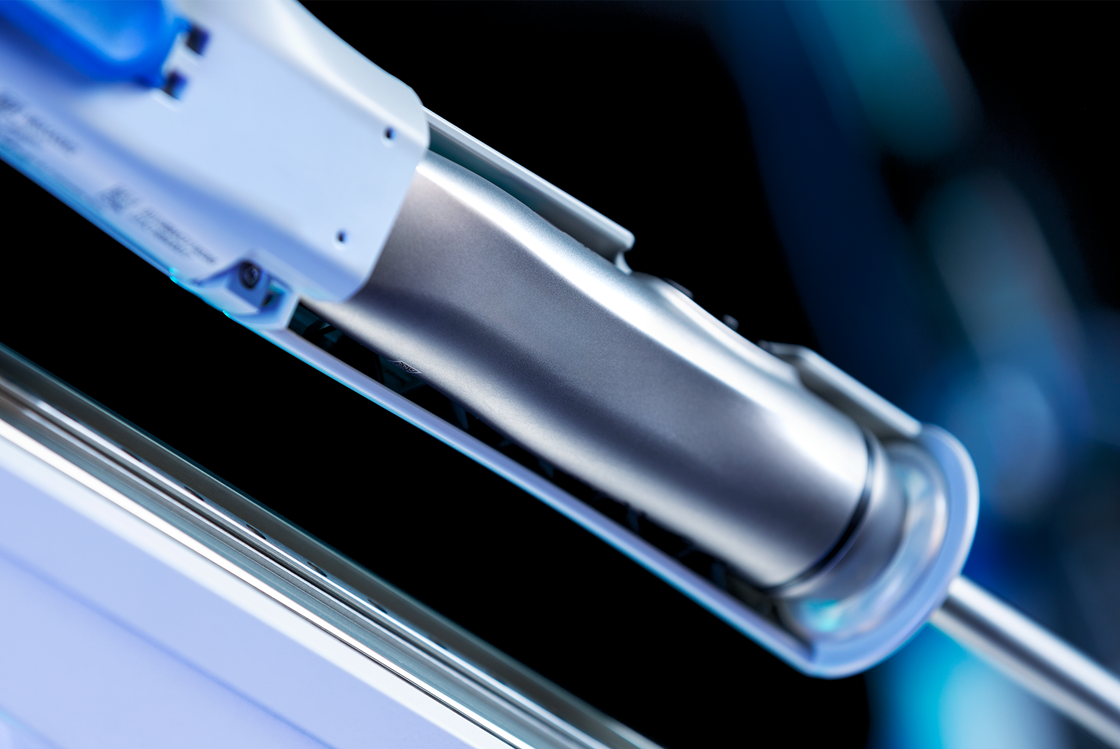Why NVIDIA is bullish on AI’s future in healthcare
Medtronic collaborates with NVIDIA to drive AI advancements in the detection of colorectal cancer

Last year, Medtronic and Cosmo Intelligent Medical Devices announced a collaboration with NVIDIA to build a new AI platform for GI Genius™, the first AI-powered endoscopy module. The use of AI in healthcare is growing significantly, spurred in part by such collaborations between companies like Medtronic and NVIDIA.
For NVIDIA’s perspective on the future of AI and healthcare technology, we spoke with Kimberly Powell, the company’s vice president of healthcare, who shared why she believes the technology can serve as a healthcare “co-pilot” for everyone, including patients and doctors.
Note: This interview was edited for length and clarity.
Why is NVIDIA investing in healthcare?
When I started with NVIDIA, one of the very first phone calls I made was to a company that’s well known for building CT scanners. One thing the healthcare technology industry focuses on is seeing inside the body, and medical devices can generate massive amounts of visual data. That data must be processed and turned into something humans can read. That’s where we come in. NVIDIA accelerated computing is capable of processing data very, very fast, and now we can apply AI applications of all kinds to enhance the information coming from sources like medical instruments and health records. Beyond providing computing platforms, NVIDIA and its partners are enabling the shift toward holistic patient care by augmenting healthcare providers’ operational and clinical care capabilities. NVIDIA has been working in healthcare for over a decade, and we are certain this is an industry in which we’re making a difference and to which we can continue contributing significantly.
Why did NVIDIA partner with Medtronic?
Medtronic, a world leader in healthcare technology, recognized early that AI can be a co-pilot in healthcare. By overlaying AI as an assistant to healthcare professionals, they can catch issues earlier and make sure patients have the best outcomes. NVIDIA is building computing platforms that can help healthcare companies achieve their goals and benefit patients.
Since NVIDIA began collaborating with Medtronic, I’ve learned a lot about colorectal cancer and how to use technology to help reduce the miss rates of polyps. Colorectal cancer is the number one cancer killer of men in the U.S., so, well, I can’t think of anything more meaningful to work on than that.
How will the integration of NVIDIA’s platform help improve the detection of colorectal polyps?
The computing platform that we’ve built with Medtronic can deliver AI at scale, bringing this capability to more places in the world and helping doctors with the early detection of colorectal cancer during real-time colonoscopies. Also, the platform can deliver many AI applications to expand the functionality of the device. It all comes down to the software and the ease of updates. I always go back to smartphones and how they continuously improve with over-the-air updates. It’s a similar case with the platform we’ve created for the GI Genius™ intelligent endoscopy system.
Recently Medtronic conducted a significant survey about how Americans feel about AI. Overall, it showed that Americans are very optimistic about certain applications of AI, such as diagnosing diseases. But it also noted some skepticism. Do you see that changing in the future with the evolution of technology?
With ChatGPT, everybody can experience AI in some shape or form, and that’s going to build consumer trust. We helped make this huge AI moment possible by building computers that enable those AI applications to be trained and deployed at scale, so, for example, even my eight-year-old daughter can interact with an AI. Grandparents, too, are talking about how they use ChatGPT. If you sit back and think about how it has stunned you personally, just as a consumer of technology, you might think to yourself, “Why wouldn’t I want every doctor to have this type of capability at their fingertips?”
I go back to this idea of AI as a co-pilot. It’s an assistant. It helps people automate tasks that might not leverage their skillsets. It helps bring together information in one place, in a given amount of time, which may not have been possible otherwise. It’s not about completely automating all processes. It's about augmenting them. And I think that if the world can really understand that, people will want the augmentation, these skills, the second pair of eyes, these co-pilots. They would want these tools to be at every clinician’s disposal, because it’s going to be what transforms their work, what elevates their craft. I don’t know why we wouldn’t all be chomping at the bit to get more of this going and out there in the world.
Important Safety Information:
GI Genius™ system is intended to be used as an adjunct to colonoscopy procedures and is not intended to replace endoscopist assessment or histopathological sampling. GI Genius™ system does not make any elaboration or alteration of the colonoscopy video streaming, it only overlays graphical markers.
- Danger: Do not use this system for any purpose other than its intended use.
- Danger: The system does not perform any diagnosis.
- Caution: The sale, distribution, and the use of the GI Genius™ system are restricted to prescription use in accordance with 21 CFR 801.109.
- Caution: The device is not intended to be used as a stand-alone diagnostic device.
- Caution: The device is not intended to characterize lesions in a manner that would potentially replace biopsy sampling.
- Caution: The device is not intended to replace clinical decision-making.
- Caution: The device is not intended to be used with equipment that was not tested against during validation activities.
- Caution: The device has not been studied in patients with Inflammatory Bowel Disease (IBD), history of CRC, or previous colonic resection. The device performance may be negatively impacted by mucosal irregularities such as background inflammation from certain underlying disease.
- Caution: Users should be aware, when using automated systems such as the GI Genius™ that provide assistance in identifying suspicious lesions, that a high level of reliance may be placed on the system output, potentially leading to user complacency and a bias towards accepting the system output results, rather than using the device as intended. The device is intended to provide adjunctive information to the endoscopist who performs endoscopic evaluations with an expected high level of clinical expertise. Placing too much reliance on the system in this way may lead to an unacceptably low level of procedural oversight ('situational awareness'), sub-par evaluation of the patient, and eventual endoscopist skill degradation, following which retraining may be necessary.
- Danger: Using incompatible equipment can result in patient injury or equipment damage and makes it impossible to obtain the expected functionality.
L001-03042024
Related content



